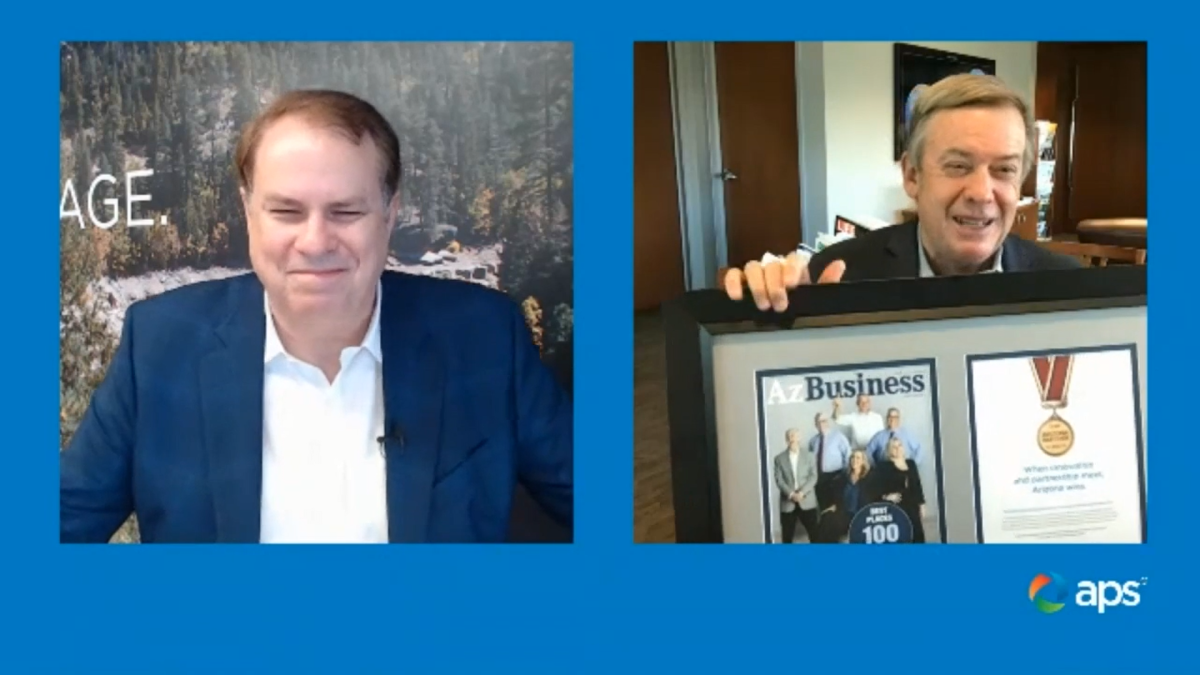When the pandemic hit last year, Arizona Public Service had no option other than to keep going.
Arizona State University found a way to help make that happen.
This week, the state’s largest utility thanked the state’s largest university with its inaugural APS Arizona Partner Award.
Jeff Guldner, CEO of Pinnacle West Capital Corporation, APS’s parent corporation, pointed out how urgent their need was. They operate a nuclear plant, high-voltage transmission lines, an extensive distribution system that in a lot of cases is overhead, not underground, and very big, dangerous power plants.
“This is an inherently risky business, and we do a tremendous job of managing that risk,” Guldner said.
“When we had the opportunity last year to address a critical need around COVID, our teams stepped up together to quickly develop a COVID testing process that we were able to deploy in the first week of April to begin testing some of our critical front-line employees through the Biodesign lab (at ASU) and then being able to get that to scale,” Guldner said. “I remember telling my colleagues ... ‘Oh yeah, we started testing for COVID in early April.’ They were like, ‘How in the world were you able to do that?’”
When the company began developing the APS Arizona Partner Award, they intended to recognize an organization that works hand in hand with them to deliver on their commitment to their customers, their communities and one another.
“ASU was a natural fit to be our inaugural recipient,” Guldner said.
“Thank you, Jeff, on behalf of the university and our teams,” university President Michael Crow said. “That Biodesign Institute team has gone on to create a test that has tested over a million tests — it’s been unbelievable. On behalf of the university, thank you. . ... We did say to ourselves, ‘We’d better test those people over there running that nuclear power plant, because we would like that thing to stay in motion.’ We were highly motivated.”
Both laughed.
ASU’s response to the pandemic has been a crucial and extraordinary exercise in teamwork and innovation, said Joshua LaBaer, executive director of the Biodesign Institute.
“From creating the state’s only saliva-based COVID-19 test and a new medical lab to process those tests, to providing mass vaccination and testing sites, to modeling and developing personal protective equipment, we’ve demonstrated that by working together, we can solve difficult challenges,” LaBaer said. “And most importantly, we can also save lives.”
It is not too much to say that the development and distribution of hundreds of thousands of high-quality COVID-19 tests saved lives in the state of Arizona, said Sally C. Morton, executive vice president of Knowledge Enterprise at ASU.
“Our entire research operation is designed to solve real problems and is nimble enough to solve them urgently,” Morton said. “We can be proud of this work as we further commit ourselves to doing more to serve our communities.”
Crow and Guldner had an hourlong discussion on innovation and balancing risk awareness with being risk-averse.
“APS and ASU are two foundational Arizona institutions,” Crow said. “We were created at the same time — 1885 or so. Both of us are essential enterprises 24/7 — never turn off, never shut off. ... Essential means we are a 'cannot fail, must innovate, must adapt, must improve, must enhance, must modernize, always at the ready' place. So we operate ASU today from that perspective. ... Typically universities are almost religiously rigid. We are no longer that.”
Crow pointed out ASU has gone from being faculty-centric to student-centric.
“It’s the freeing up the institution to design itself, not to follow the previously laid-down design structure,” he said.
Guldner spoke about a utility that is trying to move toward decarbonization.
“You have to understand when the status quo cannot be adapted to the destination you’re trying to reach,” he said. “If you want to reach decarbonization, there are just certain things that have to change. ... You have to begin taking those steps. ... You have to go out and innovate.”
COVID-19 testing and vaccinations
- The ASU community is encouraged to test regularly through Devils' drop-off. The free, no-appointment COVID-19 saliva testing option is available on all four ASU campuses in the Phoenix metropolitan area, plus ASU’s locations in Los Angeles and Washington, D.C. Learn more and find locations at devilsdropoff.asu.edu.
- Find a free vaccine location near you through the Vaccine Finder website or by calling 1-800-232-0233 (TTY 1-888-720-7489).
- ASU students, faculty and staff can sign up for free COVID-19 vaccines on campus through My Health Portal.
Top image: Pinnacle West Capital Corporation CEO Jeff Guldner (left) and ASU President Michael Crow. Screenshot by Scott Seckel/ASU News
More Health and medicine

Reducing waste in medical settings
Health care saves lives, but at what cost? Current health care practices might be creating a large carbon footprint, according to ASU Online student Dr. Michele Domico, who says a healthier…

ASU offers bilingual counseling to Spanish speakers
Arizona is one of the five states in the nation with the highest percentage of Hispanic residents, according to the U.S. Department of Health and Human Services Office of Minority Health, and …

College of Health Solutions launches first-of-its-kind diagnostics industry partnership to train the workforce of tomorrow
From 2007 to 2022, cytotechnology certification examinees diminished from 246 to 109 per year. With only 19 programs in the United States, the cytology workforce that stands at the front line of…


